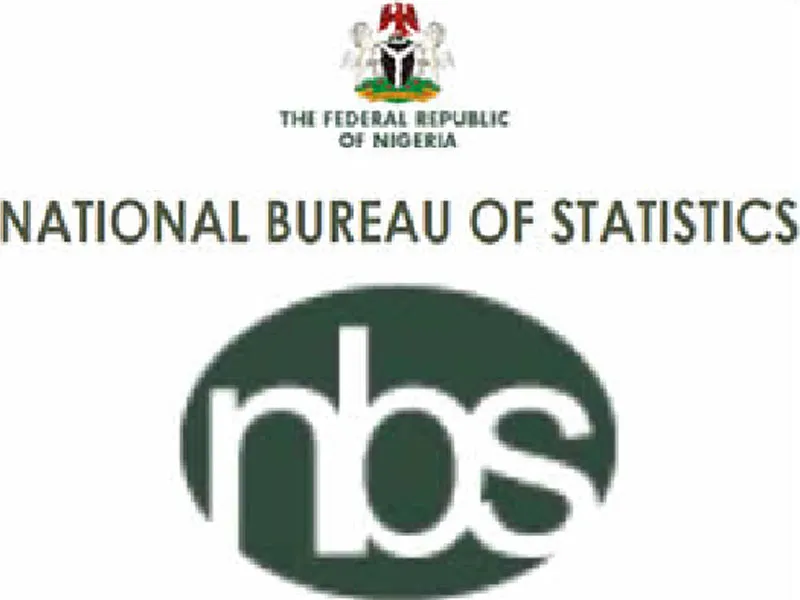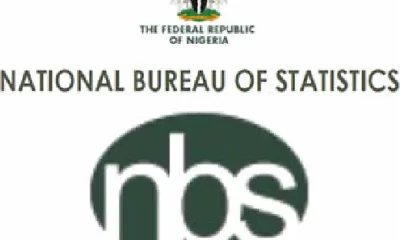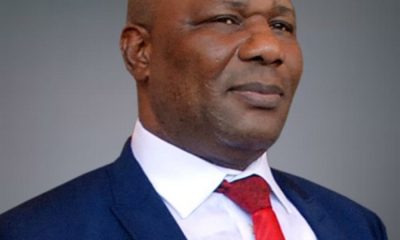BUSINESS
NBS’ll Begins MPI Report Dissemination 2023 – Statistician General

The National Bureau of Statistics (NBS), says it will begin the zonal dissemination of its MPI Report in January 2023.
Statistician General of the Federation and Chief Executive Officer of NBS, Mr Semiu Adeniran, said this at the 2nd Bi- National Consultative Committee of Statistics (NCCS) on Wednesday in Lagos.
The theme for the meeting is; “The Direct Implication of Sectorial Statistics in Curbing Inflation”.
Highlights of the 2022 Multi-dimensional Poverty Index survey by NBS reveals that 63 per cent of persons living within Nigeria (133 million people) are multidimensionally poor.
The national MPI is 0.257, indicating that poor people in Nigeria experience just over one-quarter of all possible deprivations.
Adeniran said that under the process, the results of each state in the respective zones would be presented in more detail.
He noted that the MPI report would have details such as methodology and computation process that would be explained further.
The Statistician General said that the bureau’s MPI Report includes the Nigerian Living Standard Survey (NLSS) and the Nigerian Labour Force Survey (NLFS) which together with World Bank would also provide detailed household information and insights into labour and welfare conditions in the country.
According to him, NLSS will provide detailed information on household consumption, education, health, employment, housing conditions, assets, household enterprise and other key non-monetary indicators of welfare.
On the other hand, he said that the NLFS is a strategic survey designed to collect and analyse labour market statistics for the country, including the generally understood and widely anticipated headline unemployment and underemployment rates.
“While the unemployment and underemployment rates are very important figures that indicate the number of persons economically engaged, the NLFS also contains a lot more equally interesting and important information that offer useful insight into the health of the labour market in Nigeria,” he said.
Adeniran said that under the process, the results of each state in the respective zones would be presented in more details, including the methodology and computation process explained further.
“In doing this, it is our hope that executives will have a much better understanding and interpretation of the results and be better placed to apply them in their budgeting and policy decision making processes.
“This will assist to alleviate poverty and deprivations in their states,” he said.
He said that the meeting would seek to provide updates and harmonise statistical activities, and discussions as well as reflexions on how to move the statistical system in Nigeria forward, with each member, playing their respective parts.
Adeniran said that the theme for the meeting; “The Direct Implication of Sectorial Statistics in Curbing Inflation”, is extremely fitting for the current times in the country.
According to him, inflation has become an issue of major concern all over the world.
Adeniran said that the impact of inflation on households and businesses both within and outside the country cannot be ignored.
“You only need to listen to some of the numbers and headlines emanating from some African nations and beyond, to fully understand the severity of the global situation we are facing.
“In Ghana, Ethiopia and Rwanda, inflation for the month of October was reported at 40.4 per cent, 31.7 per cent and 31 per cent respectively.
“Countries in the West are also reporting record inflation figures, with the UK recording its highest rate of 11.1 per cent, since 1981, a high of forty years.
“With these high levels of inflation, we can best imagine the effects on household consumption and poverty levels in those countries, and the report of this effect is all over the news if we simply look,” he said.
He, however, noted that the bureau was working hard to support government along these lines.
Adeniran charged the participants on the need to remain relevant and collaborate to move forward the bureau, particularly into the new year for a professional and independent assessor of socio-economic conditions in the country.
Also, in his remarks, Chairman of Governing Board, NBS, Dr Kabiru Nakaura, said the task of the meeting was to meet the need of good and realisable statistics across all tiers of government for informed decision and policy making.
“Hence, it is pertinent for all countries to have established statistical agencies such as the National Bureau of Statistics in the case of Nigeria, whose work it is to collect, process and disseminate such statistics.
According to him, planning and evidence based policy making can only be effective when statistics is promoted as a tool for development.
He advised participants to work with the Chairman and Statistician General of the Federation in sharing experiences and exchanging ideas on issues affecting the NCCS, thereby improving the quality of data produced by its various members. (NAN)
BUSINESS
FG Pushes for Modern Equipment to Boost Manufacturing

The Federal Government has said that Nigeria must transition from importing used industrial scrap to deploying world-class, resilient manufacturing solutions as part of efforts to reposition the sector for global competitiveness.
The Minister of State for Industry, Sen.
John Enoh, stated this on Wednesday during the 2025 edition of the Nigeria Manufacturing and Equipment/Nigerian Raw Materials Expo held in Lagos.Enoh declared that Nigeria could not continue to rely on outdated and imported equipment if it hopes to achieve true industrial sovereignty.
He said, “We must move from importing used, you know, industrial scrap, because most of them, that’s what they are, to deploying world-class solutions built for resilience, for sustainability.
”The minister noted that manufacturing currently contributes less than 10 per cent to Nigeria’s Gross Domestic Product and that the government is working to reverse the trend by prioritising domestic production and adding value to local raw materials.
He added that the government was finalising a Draft National Industrial Policy, which would place technology adoption, equipment financing, and power integration at the core of manufacturing innovation.
The industry minister noted that the policy is also aligned with President Bola Tinubu’s Renewed Hope Agenda, particularly the goal of diversifying Nigeria’s economy across key sub-sectors, including textiles, automotive, and agro-processing.
Enoh commended the Manufacturers Association of Nigeria, the Raw Materials Research and Development Council, and other stakeholders for working collaboratively to develop a “fit-for-purpose” policy framework.
He explained that through the planned Made-in-Nigeria campaign, likely to be anchored by the Pro-Nigeria Secretariat, the Federal Government would support certification, digital marketplaces, and media visibility for locally produced equipment and innovations.
The Minister also revealed that the government is harmonising efforts across ministries and agencies such as the Bank of Industry, the Nigeria Export Processing Zones Authority, the Nigeria Industrial Policy Council, and the National Agency for Science and Engineering Infrastructure.
He urged Nigerian manufacturers and innovators to see the Expo not just as a marketplace but as a mandate to forge strategic technology transfer partnerships and explore modular, mobile, and decentralised equipment models for underserved regions.
He also urged the stakeholders to collaborate with tertiary institutions to co-design Nigeria-specific machines and define sustainability as industrial sovereignty and inclusive economic development.
President of the MAN, Francis Meshioye, in his remarks, described the expo as an opportunity to transform intentions into innovation and enhance Nigeria’s industrial competitiveness.
He said, “We embarked on a remarkable journey, not just about showcasing capabilities, but about exploring partnerships, innovation, and sustainable practices that can propel our industry to prosperity.”
Meshioye commended participants for their enthusiasm and urged stakeholders to reflect on how insights from the event could reshape business strategies.
“The theme of this year’s expo, ‘Accelerating Sustainable Manufacturing Through Cutting-Edge Equipment and Technology Solutions’, strongly resonates with our industry’s needs,” he said.
He added, “We must make manufacturing desirable, attractive, and a household name.”
Highlights of the day included panel discussions on sustainable innovation and technology transfer in manufacturing, the growth mindset of women in manufacturing and leveraging international partnerships.
The panellists included the Consul General of India in Lagos, Chandramouli Kern; Chief Executive Officer of PROPAK, George Pearson; Senior Trade Consultant (West Africa), VDMA, Kayode Jegede; and CEO of Open Access Data Centres, Dr Ayotunde Coker, among others.
The three-day expo brought together key government agencies, private sector players, equipment manufacturers, innovation hubs, and academia to deliberate on strategies to deepen local production capacity, reduce reliance on foreign inputs, and build an inclusive, sustainable industrial future.
BUSINESS
Toyota Cuts Profit Forecast Due to US Tariffs

Japanese auto giant Toyota on Thursday cut its annual net profit forecast to 2.66 trillion yen ($18.06 billion) owing to the impact of US tariffs.
“Due to the impact of US tariffs and other factors, actual results showed decreased operating income, and the forecast has been revised downward,” the company said in a statement.
Its shares fell 0. 6 percent in Tokyo afternoon trade.The Trump administration in April imposed a 25 percent levy on Japanese cars imported into the United States, dealing a hefty blow to Japan and its crucial auto sector.
Although Tokyo and Washington announced a trade deal in July, lowering that rate to 15 percent and providing a degree of relief for the industry, it’s not yet clear when it will take effect.
There is also confusion over whether the car tariff — as well as other “reciprocal” levies — will be capped at 15 percent, or if these would come on top of those in place before Trump’s trade blitz.
The auto industry had a pre-existing 2.5 percent tariff, meaning the levy currently stands at 27.5 percent.
Revenues in Toyota’s first quarter from April to June were up 3.5 percent, but net income dropped by 36 percent.
BUSINESS
Dangote Bags ‘Cement Company of the Year’ Award At Africa Housing Show

Africa’s largest cement manufacturing company, the Dangote Cement Plc, has added to its numerous accolades as it received the ‘Cement Company of the Year’ award at the just concluded Africa International Housing Show (AIHS) in Abuja.
The Dangote Cement Plc is one of the sponsors of the four-day housing exhibition that ended last Friday, where 21 countries and about 40,000 exhibitors.
participated.Presenting the award on behalf of the organizers of the show, Governor of Sokoto State, Ahmad Aliyu Sokoto, who was represented by his Deputy, Engr. Idris Mohammed Gobir, described the Dangote cement as a household name and the pride of Africa.
According to him, the Dangote Cement has supported Nigerian economy through job creation and philanthropy, among others.
The Minister for Housing and Urban Development, Ahmad Musa Dangiwa had lauded Dangote Cement Plc for its contributions to the development of the Nigerian Economy, urging the company to join hands with government in bridging the gap of Housing deficit in the Country.
Coordinator of the Show, Bar. Festus Adebayo had said that the housing deficit in the country can be mitigated through Public Private Partnership (PPP).
He said: “Innovation and collaboration are top priorities for us, given the rapid technological advancements in housing construction, financing and system improvements.”
Bar. Adebayo said he was optimistic that the partnership with Dangote Cement Plc will help address the narrative of housing shortfall in the country.
Speaking earlier, the Director General, Nigerian Building and Road Research Institute, (NBRRI), Prof. Samson Duna, said: “Dangote cement dominates the Nigeria and West Africa markets in respect of patronage and is doing well. Dangote Cement stands for standard and quality. Thumbs up for Dangote cement”.
Speaking at the company’s Special Day, the National Sales Director, Dangote Cement Plc, Dolapo Alli, said: “Addressing housing issues requires collaboration among various stakeholders, including government agencies, private developers, non-profits, and communities. The government can adopt public-private partnerships (PPPs) to support mass housing initiatives.
“Through PPP models, the government may initiate the construction of new estates, while companies and firms in the building and construction sector can be granted tax waivers and credits to facilitate the financing of new and affordable housing developments.”
A statement from the company’s spokesman Anthony Chiejina had said that the theme of the 2025 Show: Reimagining Housing Through Innovation, Collaboration and Policy” aptly resonated with its core value.
























